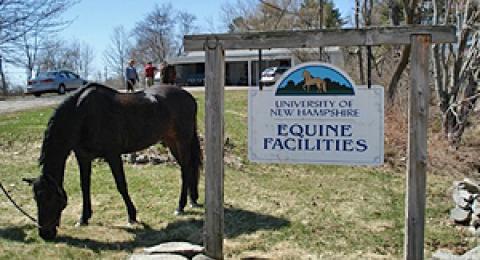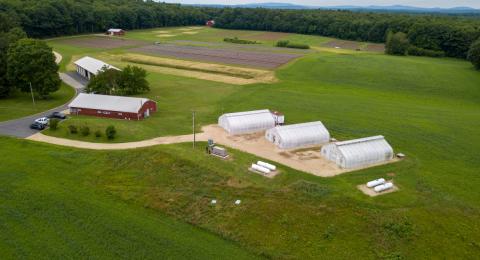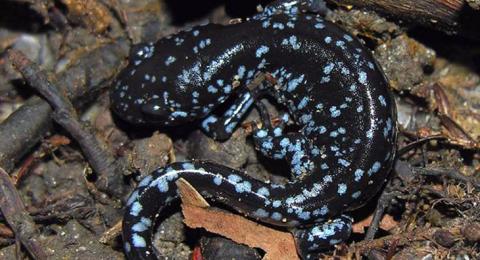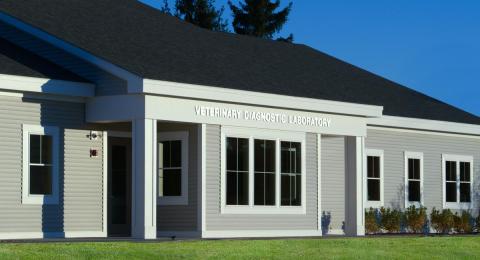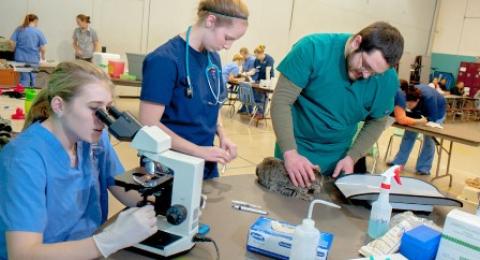The UNH Brewing Science Laboratory is both a fully equipped professional beverage manufacturing facility and one of the most advanced analytical beer chemistry labs in the state.
The laboratory, which was completed in the spring of 2018, supports UNH’s Brewing Science minor and provides beneficial beer testing services to New Hampshire brewers. Learn More
The laboratory, which was completed in the spring of 2018, supports UNH’s Brewing Science minor and provides beneficial beer testing services to New Hampshire brewers. Learn More
All of UNH's equine facilities are conveniently located on the main campus, within a 10-minute walk of the campus center or they may be reached by campus shuttle bus service. Facilities include:
Learn More
This NHAES/COLSA facility is representative of a typical New England Dairy operation, thereby developing new knowledge and management expertise geared directly to many state and regional stakeholders. It houses about 90 milking-age cows and approximately 70 growing, replacement animals. Included in that number is the 20-cow, student-managed CREAM herd (CREAM is the acronym for Cooperative for Real Education in Agricultural Management), with the remaining animals devoted primarily to research in the area of dairy nutrition and reproductive biology.
Learn More
A research facility primarily focused on horticultural and agronomic crops, wildlife management, and a part of the Great Bay oyster renovation effort. The farm is the site for the extensive cucurbit breeding program, the longest-running such program in North America, and emerging research on sustainable forage production, agricultural soils, and pollination services. The farm contributes forages for the dairy and equine programs. Daily operations are carried out by the Kingman Farm staff.
Learn More
The facility provides highly controlled environments for a diversity of research projects, including ornamental and food crop breeding, sustainable ornamental plant nutrition and development, aquaculture, biological pest control, bioremediation, and plant genetic diversity as well as instructional activities. The greenhouse environments are monitored and precisely regulated through a computer-based control system that creates a sustainable growing environment through the conservation of heat, electricity, water and fertilizer, and increased plant resistance to insect pests and diseases.
Learn More
There are two multi-use fields, Thompson Farm and Moore Field. Thompson Farm is a 205-acre farm consisting of forest, hayfields and tillable land used for forage and corn silage production. Moore Field includes about 90 acres of cropland plus adjacent woodlands, 1.5 miles from campus off highway 155A toward Lee. Its primary use is for research and feed production.
Learn More
Learn More
Research farms and greenhouses offer outstanding opportunities for hands-on teaching and experiential learning about sustainable agriculture by graduate and undergraduate students within UNH academic programs, and formal and informal outreach and engagement with stakeholders of our state and region.
Learn More
The NHVDL assists the NH Commissioner of Agriculture and State Veterinarian in their efforts to monitor and control important animal diseases. We contribute to the academic, research and outreach missions of the University of New Hampshire College of Life Sciences and Agriculture
Learn More
The Organic Dairy Research Farm is operated by the NH Agricultural Experiment Station and College of Life Sciences and Agriculture, and represents the first of its kind at a land-grant university. It is intended to help the University of New Hampshire explore opportunities for regional dairy producers through research.
Learn More
The Thompson school veterinary technology program offers low-cost veterinary care to qualifying pet owners during the academic year. We serve residents of the Somersworth and Dover Housing Authorities and other qualifying low-income pet owners. The on-campus veterinary clinic is managed and operated by students under the supervision of licensed veterinary professionals.
Learn More
The primary activities at the Woodman Horticultural Research Farm at UNH are research, teaching and outreach on the production of horticultural and ornamental crops.
Learn More

